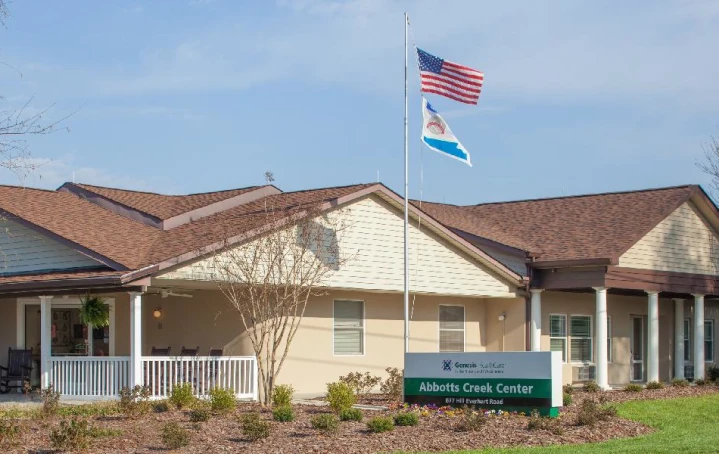


View all photos
Nursing Home Gallery






Amenities for Abbotts Creek Center
activities
cultural devotional services
Devotional Activities On-Site
Other Religious Services
other
Activities On-site
pets
Pet-focused Therapy Programs
community amenities
common areas
Barber Shop
Beauty Salon
Garden
Computer or Media Center
Indoor Common Areas
Private Bath
dining
Private Dining Room
languages spoken
English
memory care
Enclosed Courtyard
Wander Guard or Similar System Available
recreational areas
Game Room
services
Housekeeping
Laundry Service / Drycleaning
smoking
Smoke Free Environment
transportation parking
Complimentary Transportation
dining
dining services
In-room Dining
healthcare services
high acuity care
IV Care
Ventilator Care
medication management
Full Medication Management Available
Pharmaceutical Delivery Service
other
6 to 8 hours a day
staffing ancillary services
Hospice Available On-Site
Nutritionist / Dietician
Optometrist
Pet Care Available
Dental Care
Occupational Therapy
Physical Therapy
Podiatry Care
Speech Therapy
Palliative Care
Rehabilitation Therapy
Discharge Planning
Case Management
Orthopedic Rehabilitation
Colostomy Care
Psychiatric Services
X-ray
Pain Management
room amenities
bathroom
Private Bathroom
other
Air Conditioned
Private patio, deck, or balcony
Individual Climate Control
utilities
Cable or Satellite TV
Wi-Fi/high-speed internet
Your review of Nursing home name
Important info!
If you are either a resident, or family/friend of a resident, please share your insights and experiences in as much detail as
possible to help others learn more about this facility.
Please note we cannot accept your review if you work at this facility, or if you have a professional connection to this facility
(e.g. a visiting doctor or hairstylist).
Please note we cannot accept your review if you have only toured this facility, you must be connected to a resident to leave
a review.
Please note this is not a formal complaints procedure, and nursinghomes.com does not license, oversee or regulate nursing
homes. For complaints about Facilities, we encourage you to contact the Facility directly.

